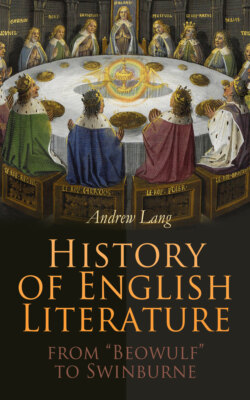Читать книгу History of English Literature from "Beowulf" to Swinburne - Andrew Lang, Robert Kirk - Страница 46
На сайте Литреса книга снята с продажи.
Tristram.
ОглавлениеThe earliest English romances, or novels of chivalrous adventures, are couched in metre. Among the first is "Sir Tristrem" (usually spelled Tristram); certainly this has been the most popular in modern times. Sir Walter Scott edited it, from the copy in the Auchinleck Manuscript (a collection of early poems once in the possession of Boswell of Auchinleck, father of Dr. Johnson's Boswell).1
Sir Walter was persuaded that "Sir Tristrem" was written from local Celtic tradition, by the famed Thomas of Ercildoune, called the Rhymer. Thomas, who dwelt at Ercildoune (Earlstone on Leader water), was a neighbour, as it were, of Scott at Abbotsford; he died between 1286 and 1299, and he had great though obviously accidental fame, as a prophet.
The poem on Tristram begins with the words,
I was at Erceldoune
With Thomas spake I there,
There heard I rede in roune
Who Tristram gat and bare,
(that is, "I heard who the father and mother of Tristram were")
Who was King with croun;
And who him fostered yare;
And who was bold baroun.
As their elders ware,
Bi yere:—
Thomas tells in toun,
This auventours as thai ware.
The English poet uses this difficult stanza in place of the simple rhymes of a French original which knew nothing of Ercildoune. In similar stanzas, of French origin as usual, the whole romance is told. Throughout "Tomas" is mentioned as the source of the story—"as Tomas hath us taught".
There are fragments of an earlier French romance in which Tomas is also quoted as the source, and an early German version, by Godfrey of Strasbourg refers to Thomas of Britanie.
Scott was well aware that the story of Tristram was popular in France long before the time of Thomas of Ercildoune, but he liked to believe that Thomas collected Celtic traditions of Tristram from the people of Leaderdale and Tweeddale, though they, by 1220-1290, were English in blood and speech.
In the romance, Tristram is peerless in music, chess-playing, the fine art of hunting, and of cutting up the deer; and his main virtue is constancy to Iseult, wife of his uncle, King Mark. This unfortunate prince is not the crafty avenger of his own wrongs, as in Malory's "Morte d'Arthur," but a guileless, good-natured being, constantly and ludicrously deceived. Iseult is treacherous and cruel, but everything is forgiven to her, and, as the manuscript, is defective, we do not know how the poet handled the close of the tale, the episode of the other Iseult "of the white hands". Scott finished the tale in the metre and language of the original. Tristram is dying in Brittany, only Iseult of Cornwall can heal him, as only Œnone could heal Paris. Tristram sends for her, the vessel is to carry white sails if it bears her; black, if it does not. The idea is from the Greek saga of Theseus. The second Iseult, wife of Tristram, falsely reports that the sails of the vessel are black. Tristram dies, and Iseult of Cornwall falls dead when she beholds him.
Swiche lovers als thei
Neer shall be moe,"
concludes Sir Walter.
